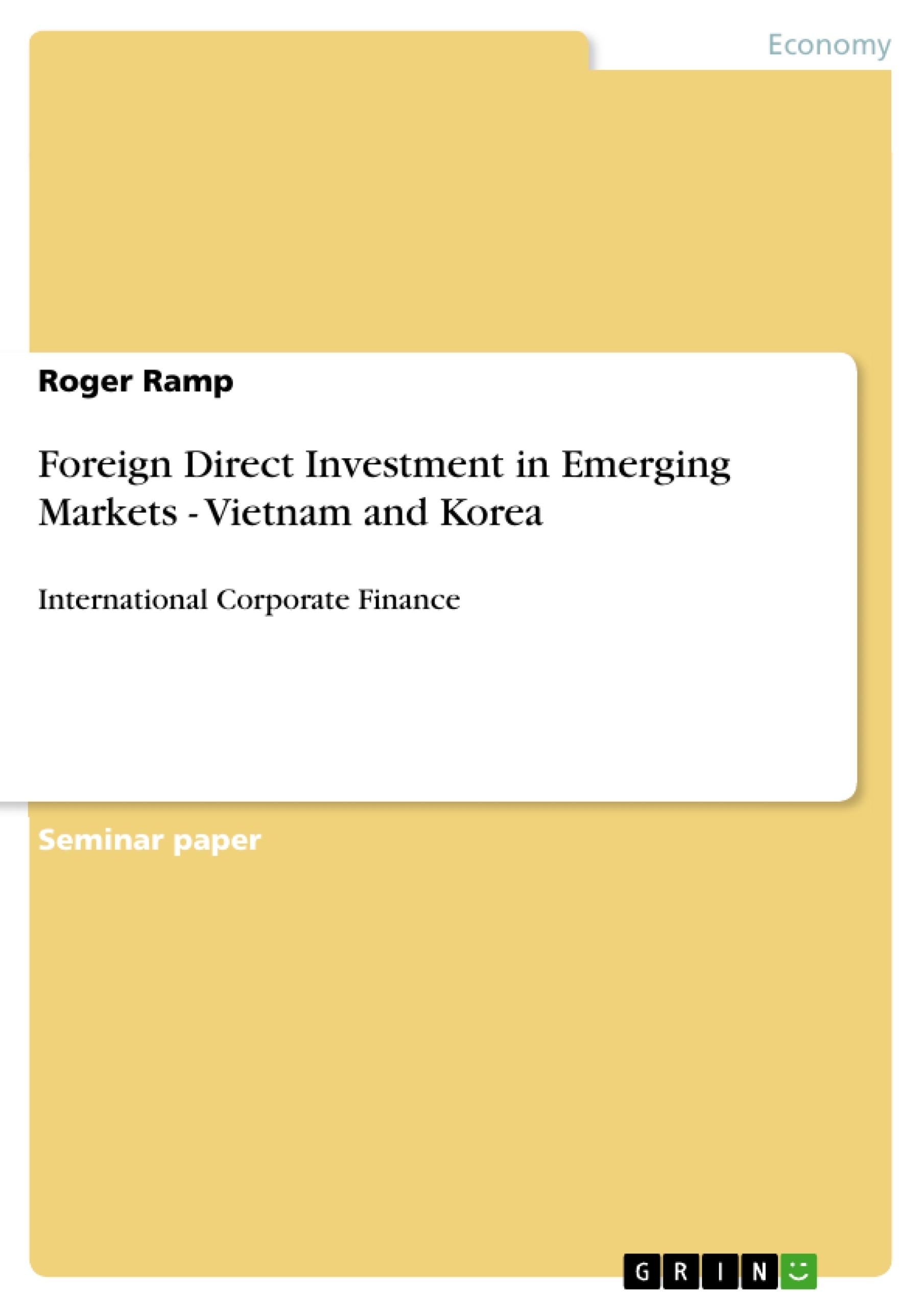Foreign direct investment (FDI) is found almost everywhere in the world today and closely connected to worldwide globalization. Why do enterprises which are suc-cessfully operating in their home market decide on making investments in unknown and more insecure markets? Why do investment destinations have an interest in admitting foreign investors into the economy? Considering that FDI has grown in importance in the global economy in the last decades, obviously there has to be significant advantages for both sides. The World Investment Report (WIR) of UNCTAD reports in their recent publication (2008) high records in FDI flows in the world (UNCTAD 2008a). While developed countries still attract the largest volume of FDI inflows, developing countries possess the highest growth rate in drawing a significant volume of investment into their economy. Transforming and emerging markets in South, East and Southeast Asia particularly showed rapid development of generated inflows and their economies are prospering. China is a famous exam-ple. In our paper, we would like to introduce a not so well-known little tiger – Vietnam – and South Korea, which is after impressive growth in the last decades due to FDI now on its way to becoming an industrialized country.
First we will give a short theoretical overview of FDI. We will not analyze all global flows and development of FDI. Our focus lies in the development and framework of FDI in both above-mentioned countries and answering the question which impact did FDI have on their economic development. Therefore follows an especially economical introduction of both countries and then a deeper look into sectors of FDI. We will give a short classification of development in Vietnam and in South Korea in comparison to global trends. In the final part of our paper, we will go into risks and weaknesses of both countries. At the end, we will give our conclusion concerning the impact of FDI on the two reviewed countries.
Inhaltsverzeichnis (Table of Contents)
- 1. INTRODUCTION
- 2. GENERAL OVERVIEW OF FOREIGN DIRECT INVESTMENT
- 2.1 Definition FDI
- 2.2 FDI versus alternatives
- 2.3 Business-oriented motivations
- 2.4 Before decision: Economic analysis
- 3. COUNTRY INTRODUCTION - VIETNAM
- 4. COUNTRY INTRODUCTION - KOREA
- 5. FDI IN VIETNAM AND KOREA
- 5.1 Classification of FDI in Vietnam and Korea according to world FDI 2007
- 5.2 Recent Development
- 5.3 FDI in Vietnam - according to sectors and countries
- 5.4 FDI in Korea - according to sectors and countries
- 6. RISKS
- 6.1 General risks
- 6.2 Risks and weaknesses in Vietnam
- 6.3 Risks and weaknesses in Korea
- 7. CONCLUSIONS
- 8. SOURCES
Zielsetzung und Themenschwerpunkte (Objectives and Key Themes)
This paper aims to explore the impact of Foreign Direct Investment (FDI) on the economic development of Vietnam and South Korea. It investigates the motivations behind FDI decisions, the specific sectors and countries involved, and the risks associated with investing in these emerging markets.
- Definition and characteristics of FDI
- Economic analysis of Vietnam and South Korea as investment destinations
- FDI flows and development in both countries
- Analysis of FDI sectors and country-specific investment patterns
- Assessment of risks and challenges related to FDI in Vietnam and South Korea
Zusammenfassung der Kapitel (Chapter Summaries)
The first chapter introduces the topic of FDI and its global significance, highlighting the increasing importance of emerging markets. The second chapter provides a general overview of FDI, defining the concept and exploring its motivations and decision-making processes within a wider economic context. Chapters 3 and 4 provide economic introductions to Vietnam and South Korea, respectively. Chapter 5 delves into the specifics of FDI in these two countries, examining its classification, recent development, sectorial distribution, and country-specific investment patterns. Chapter 6 analyzes the risks associated with FDI in Vietnam and South Korea, including both general risks and country-specific weaknesses. The conclusion, Chapter 7, will summarize the findings and discuss the impact of FDI on the two countries reviewed.
Schlüsselwörter (Keywords)
The paper focuses on Foreign Direct Investment (FDI), emerging markets, Vietnam, South Korea, economic development, sectorial analysis, risk assessment, and investment patterns.
Frequently Asked Questions
What is Foreign Direct Investment (FDI)?
FDI refers to investments made by a company or individual in one country into business interests located in another country, establishing a lasting interest and significant influence.
Why is Vietnam an attractive market for FDI?
Vietnam is considered a "little tiger" due to its rapid economic growth, prospering economy, and increasing inflows of investment, similar to the early development of China.
How has FDI impacted South Korea's economic development?
FDI played a crucial role in South Korea's transition from a developing nation to a highly industrialized country following decades of impressive growth.
What are the common risks of investing in emerging markets?
Risks include economic insecurity, regulatory weaknesses, political instability, and specific sector-related challenges in both Vietnam and South Korea.
What motivates businesses to choose FDI over other alternatives?
Motivation is usually business-oriented, such as seeking new markets, lower production costs, access to resources, or strategic advantages in a globalized economy.
- Quote paper
- Roger Ramp (Author), 2009, Foreign Direct Investment in Emerging Markets - Vietnam and Korea, Munich, GRIN Verlag, https://www.hausarbeiten.de/document/126154


